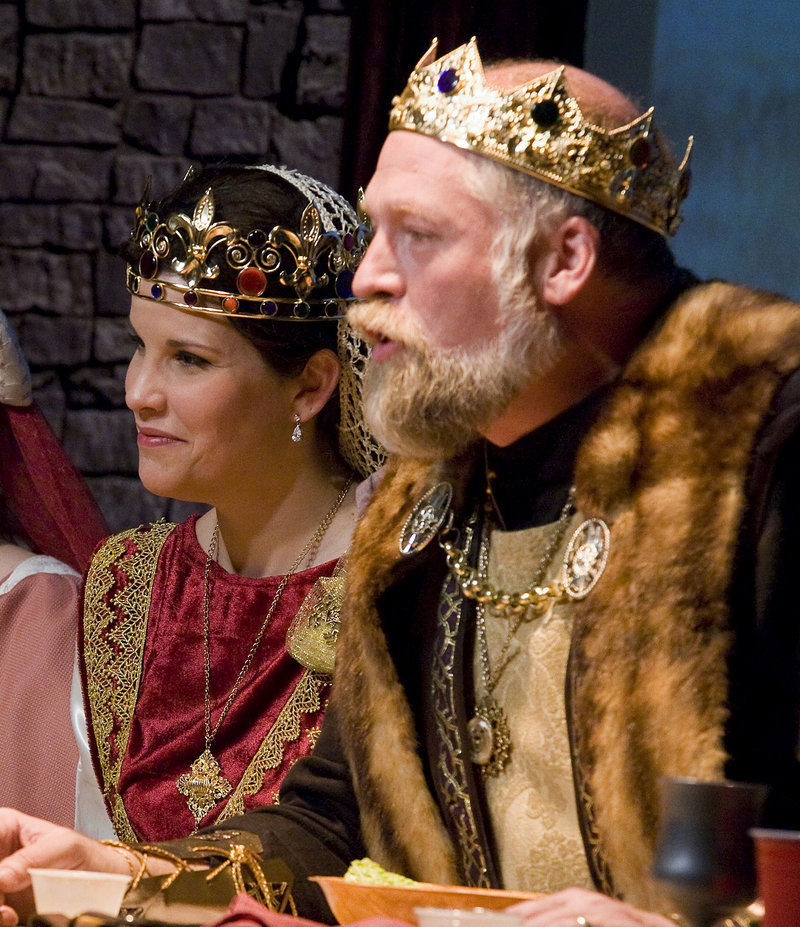Modern-day diners have gotten out of touch with their food.
Back in the medieval day, eaters dove into dinner hands first, unabashedly plunging their fingers into a plump goose thigh, herring or eel.
As uncouth as it may seem to present-day folk, spoons and forks simply weren’t used. It wasn’t a silverware misunderstanding, as though those utensils existed but were shunned from the table and used only to farm very small plots of land.
Common flatware simply hadn’t been invented. Occasionally a pocketknife or dagger was used to cut meat or bread, but on the whole, food was eaten with bare mitts, otherwise known as “God’s forks.”
The hands-on notion goes against the dinnertime policies established by most modern mothers and restaurant managers. Besides, manhandling mashed potatoes isn’t all it’s cracked up to be, especially when the “research” leads to a permanent ban from several of the area’s better eateries.
But locals can get medieval on their meal during the Medieval Feast at the Franco-American Heritage Center in Lewiston on Saturday. Nobility and peasants alike are welcome at the banquet, which doubles as a fundraiser for the center.
Guests will be greeted by wandering minstrels and led to a forested glen by court squires, where all will await the arrival of the king and queen. The royal duo will then lead the party to the Hall of Feasts for a medieval dinner filled with carrot cream soup, sausage and beef turnover, romaine lettuce with dipping sauce, pork spareribs and chicken. Alcoholic beverages will also be available.
Staying true to the time, the meal is eaten sans silverware.
Complete medieval accuracy is impossible, of course — fire codes put a damper on the open flame, and we’ve grown too used to flushing toilets to forgo them now.
But in the interest of authenticity, and in case you’re not up on your Middle Ages etiquette, here’s a feasting refresher:
n No spit. Contrary to belief, the men and women of the medieval period weren’t completely dirt-ridden and mannerless. Hands were washed before eating, and spitting on the dinner table was thoroughly frowned upon. Instead, the spit-inclined are encouraged to use the floor — the classier place for sputum.
Lip-smacking, belching and “falling upon your dish like a swine” are also considered bad form, and it is never OK to dip your meat directly into the salt bowl.
n Keep your breath to yourself. Feasters are discouraged from blowing on their hot soup in an effort to cool it down. Considering the atrocity that was medieval oral hygiene, exhaling over your food is not only uncouth, it could kill the lady sitting across the table.
n Tip your wenches. While the presence of a tavern wench at a medieval feast appears to be historically questionable, tip Saturday’s buxom gals just the same. Dinner guests will recognize them by their ample ale-slinging capabilities and revealing — ahem — personalities.
n Donate your trenches. Diners of the upper class were served meals on plates, while lower-level eaters often shared “trenches,” or pieces of hard bread with the innards scooped out. Eating the bread plate was allowed, but the noble guest leaves his trench for the beggars.
Table neighbors, particularly the lower class, often shared trenches, which means pilfering food from your neighbor’s plate isn’t thievery — it’s historical accuracy. You might also take a few swigs from his drinking vessel, as those were also shared. But for serf’s sake, don’t drink with a full mouth.
n Wipe it good. During the meal, you’re welcome to wipe your fingers on a cloth napkin, which should be draped over your left shoulder or left wrist. But don’t be shy about using your clothes in the case of a runny nose.
Food scraps can be brushed onto the floor for the dogs. In such case where there are no dogs, the food can still be tossed to the floor, where it will be buried safely under a layer of straw until the spring, when someone gets around to sweeping.
n Drink strong. Ale drinking was a regular part of medieval life — even for peasants who, in truth, deserved a good plastering more than anyone. When the Black Death swept through Europe in the 14th century, it was thought that strong drink would prevent the disease. (It didn’t.) But being half in the bag meant drinkers were at least less concerned.
n Send out your (almost) dead. Should you start to feel ill at the Saturday feast, seek out a barber amid the crowd. Barbers doubled as surgeons in the Middle Ages and were always game for a good blood-letting (although — small detail — said blood letting rarely benefits the patient).
n Apres feast. Following a feast, dinner guests sought out entertainment with merry activities such as backgammon, bear baiting and “hot cockles,” a game where one person is blindfolded on his knees and has to guess the identities of the people hitting him.
Present-day dinner guests might question the sanity of such “entertainment,” but these are the same folks who thought it was sensible to try animals in court. Instead, a movie will be shown following Saturday’s meal and merriment — it’s entertainment without the hassle of catching a bear.
The Medieval Feast will lure attendees back to the days of yore, and while the floor spitting and cup sharing can remain in their historical place, perhaps we can lift the hands-on dinner ban and get back in touch with our history while touching our food.
Staff Writer Shannon Bryan can be contacted at 791-6333 or at:
sbryan@mainetoday.com
Send questions/comments to the editors.



